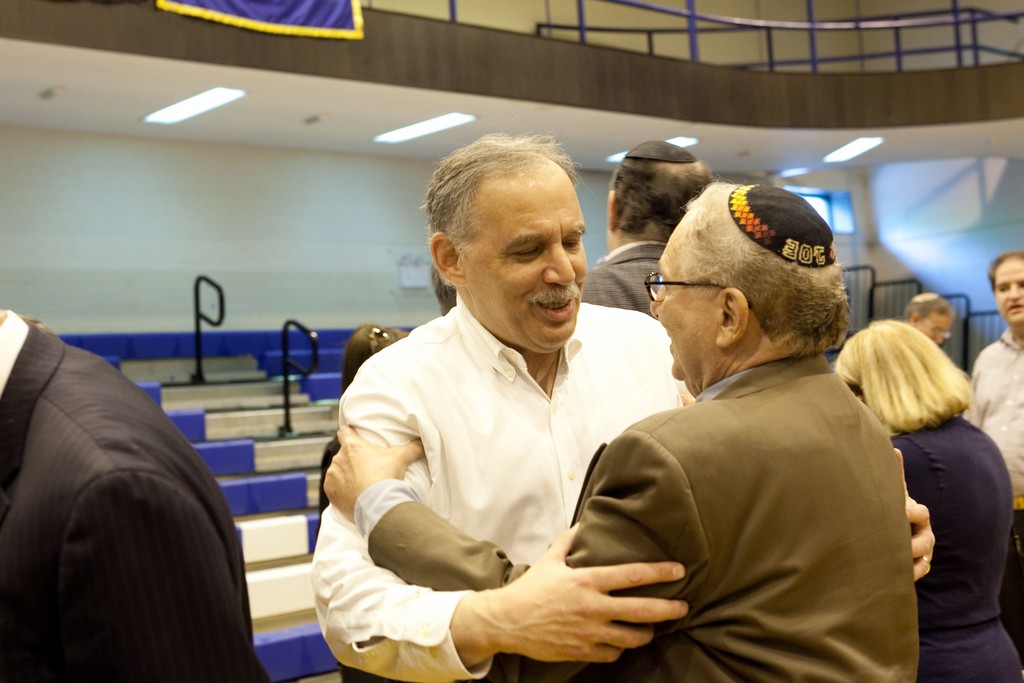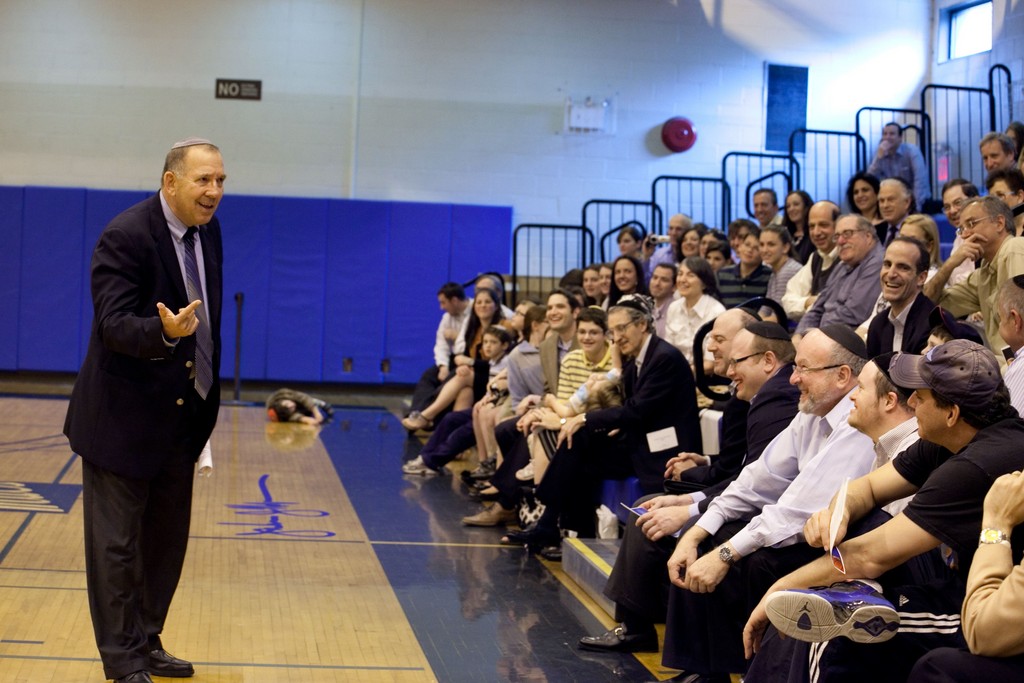Representing YU on and off the court
On May, 6, 2012, Yeshiva University held a Tribute to Coach Jonathan Halpert celebrating his 40-year basketball coaching career. At the ceremony, the basketball court at the Max Stern Athletic Center was named in his honor and a special Coach Jonathan Halpert Scholarship Fund was established. The event was very well attended and included various Rabbis, Yeshiva faculty, officers and colleagues, many family members including children, in laws and grandchildren, friends and community members, rival coaches, referees and a myriad of former players. Some of the players were members of the Manhattan Talmudic Academy JV which launched Coach Halpert’s coaching career. The balance were many former Yeshiva players representing four decades of Yeshiva basketball. A number of former players and colleagues spoke quite beautifully and appropriately in honoring Coach Halpert, and the ceremony culminated with Coach Halpert addressing this large crowd of admirers and loved ones.
Coach Halpert chose to address the large crowd intimately without use of any artificiality including microphones or any other devices. It appeared fundamentally appropriate to me that Coach would chose to address us in this manner. Every interaction I had ever experienced with Coach Halpert reflected his refreshingly open, honest, mature, intelligent and respectful manner. Coach never relied on props (except for chairs in practice when we were short on players) to convey his thoughts to us. In fact, this was exactly how I remembered him from the time I first met him when I was a 12 year old camper at Camp Raleigh, in 1967, where he was the boys’ head counselor. Johnny (we called him Johnny then) ran boys campus like a well-tuned Swiss watch. Those six summers I spent at Camp Raleigh were unquestionably the best summers of my life, despite the meticulously organized manner in which Johnny ran boys’ campus. I actually spent a lot of time with Johnny (and Aviva) during those years (not necessarily voluntarily), as I had difficulty conforming to his (or really any) reasonable schedule. Despite experiencing a multiplicity of creative adverse consequences, which Johnny (after likely consulting with Aviva) implemented once I developed an immunity to docking, never once did I feel that he was unfair since each sentence appeared to reasonably match each infraction I committed. I reflected on this as Johnny commenced his remarks. I couldn’t hear him as clearly as I would have preferred as my seat was at some distance from where he stood so I strained to listen.
Coach shared many wonderful memories with us. He recollected that he was asked by MTA coach Hi Wettstein to coach the MTA varsity against Albertus Magnus, a prominent Catholic basketball power in New York (after Coach Wettstein was temporarily incapacitated) when Coach Halpert played for Yeshiva. MTA shockingly prevailed and Coach Halpert expressed his joy in contributing to this special experience which each of the MTA players realized. He was flooded with memories of many players forever captured in many moments in many games played over his 40 year coaching career. He recalled many sweet victories and many heartbreaking defeats. He emphasized that we had run and had prevailed and that we had run and lost, but that we were never defeated since we played as he coached our and his hearts out each game. He spoke with passion and emotion, and I felt the depth of how much he cared for each of us. He expressed his profound gratitude to Yeshiva for allowing him to fulfill the meaningful life he chose to live. He thanked everyone there for contributing to his satisfaction in coaching us at Yeshiva. As I said, I couldn’t hear each word, but his feelings of affection, respect and appreciation for each of us soared well above and resonated throughout the gym named in his honor. He expressed his gratitude to the two coaches who made the greatest impact on his coaching career, Hi Wettstein and Red Sarachek. Finally, he reflected on the first time he formally dated Aviva almost 50 years ago at Camp Massad. Naturally, they played a game of 21 (basketball of course)…and she won.
As Coach Halpert delivered his beautiful speech, I reflected on the first time I experienced a brilliant speech at Yeshiva University. I was an 18 year old freshman at Yeshiva and the basketball season had ended just a couple of weeks back. I heard that a brilliant Rabbi, Rabbi Soloveitchik, (“The Rav”) would be giving his annual Yurtzeit Purim Shiur in early March 1974 at Yeshiva, and I decided to check it out since I was no longer required to spend my evenings at basketball practice from 7-10 P.M. I knew little about the Rav, as I was a graduate of the super garbage shiur at BTA, which apparently disqualified me from membership privileges in the Rav’s shiur. The place was packed, which basically meant that it reflected the antithesis to our team’s capacity to attract a loyal fan base save for a handful of diehard fans (with idiosyncratic taste in their choice of entertainment). The Rav began his eloquent discourse and I was almost immediately overwhelmed yet transfixed by the beauty, grandeur, scope and breadth of the Rav’s transcendent message. I could not comprehend or distill what the message meant, but i intuitively understood that I was experiencing sublime human perfection….
Afterward, I discovered that the Rav was the paragon and spiritual authority of Yeshiva University’s idealistic message that an Orthodox Jew can achieve fully integrated status by maintaining his separate and inviolate spiritual and Covenantal identity while simultaneously participating as an active member in society. After understanding that I actually had a responsibility as an Orthodox Jew, I wondered how a person actually went about fulfilling this obligation.
Coach Halpert emphasized that throughout his career he felt the profound responsibility of shaping a basketball team that properly represented Yeshiva on the competitive court, while simultaneously manifesting Yeshiva University’s ideal of paradigms of Torah and Madah. As the speech ended, I began to understand how Coach Halpert and Rabbi Soloveitchik had forged an indelible bond dedicated to providing each of us with the capacity to represent Yeshiva, throughout our lives, as appropriate role models in each of our communities. After all, we had the best life coach and role model, Coach Jonathan Halpert and his wonderful wife Aviva, to provide us with the requisite values and principles which would guide us throughout our lives, and for that I am profoundly grateful.
Jerry Joszef is a tax attorney living in Woodmere. He’s proud to call himself a YU alum.

 49.0°,
Fair
49.0°,
Fair 







